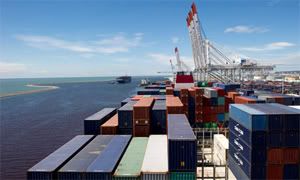
photo credit The Guardian via Reuters & Gonzalo Fuentes
Don't you love when big businesses do the right thing? Major shipping industry companies are reducing their speeds cross-ocean in order to lower fuel consumption and greenhouse gas emissions. Sure, it's to save a little money too, but in scenarios like this everybody wins.
"The world's largest cargo ships are travelling at lower speeds today than sailing clippers such as the Cutty Sark did more than 130 years ago. A combination of the recession and growing awareness in the shipping industry about climate change emissions encouraged many ship owners to adopt "slow steaming" to save fuel two years ago. This lowered speeds from the standard 25 knots to 20 knots, but many major companies have now taken this a stage further by adopting "super-slow steaming" at speeds of 12 knots (about 14mph)."
Maersk is again leading the way, and it's estimated they've already saved £65 million! The company has been getting some love from the marine environmental community recently - earlier this year the company refused to transport marine species at risk such as sharks, whales and certain commercial fish species.
Other companies, such as BP and the British Royal Navy, have been using alternative methods to cut CO2 emissions...which honestly I've never heard of, but sound awesome:
"Some ships have been fitted with kite-like "skysails", or systems that force compressed air out of hulls to allow them to "ride" on a cushion of bubbles. These measures can cut fuel consumption by up to 20%."
Slowing down would also lessen the occurrence of marine mammal ship strikes, which remains a problem. Researchers at the New England Aquarium have been working with shipping industries to re-route container ships in order to largely avoid pods of endangered right whales. For more on their work, click here.
Full article here (The Guardian)
No comments:
Post a Comment